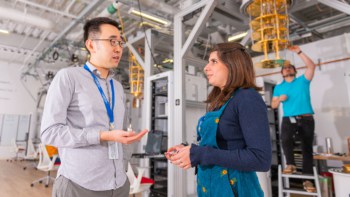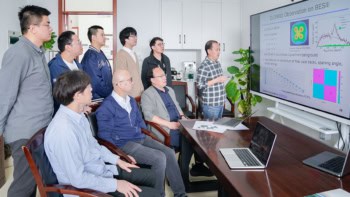Seven quantum hardware companies have been awarded multimillion-pound contracts to build a series of quantum testbeds at the National Quantum Computing Centre by March 2025

The UK’s National Quantum Computing Centre (NQCC) is investing £30 m to establish seven quantum computing testbeds based on different hardware technologies by March 2025. All of the system-level prototypes will be built by quantum hardware companies at the NQCC’s facilities on the Harwell Campus in Oxfordshire, and will be based on state-of-the-art technology platforms to support the NQCC’s mission of accelerating the development of quantum computing capabilities and infrastructure within the UK.
In establishing these quantum testbeds, the NQCC is aiming to showcase, demonstrate and evaluate the capabilities of different hardware solutions. While quantum computers promise to transform our lives by tackling problems that are beyond the reach of classical machines, more work is needed to identify and overcome the critical challenges that stand in the way of developing scalable quantum processors that can run more complex computational tasks.
By hosting multiple testbeds across a variety of qubit platforms, our aim is to support the growth of UK’s quantum computing sector and to reach the milestone of demonstrating quantum advantage in the longer term
Simon Plant, Deputy Director of Innovation at the NQCC
As a result, the seven projects funded through the initiative reflect the range of qubit architectures that could offer a pathway to fault-tolerant quantum computing. Rigetti, for example, will build a testbed with 24 superconducting qubits, while Oxford Ionics will demonstrate a trapped-ion platform based on technology originally developed at the University of Oxford. Two of the projects, awarded to QuEra and Infleqtion (formerly ColdQuanta), will assemble hardware systems based on neutral atoms, while ORCA Computing and Aegiq will take different approaches to photonics-based quantum computing. The seventh project, meanwhile, will see Quantum Motion create a demonstration platform that exploits spin qubits within a silicon-chip architecture.
Against the clock
In each case the hardware developers have been challenged to build a fully-functioning system within a sprint timeframe of just 15 months. With such an aggressive timescale the key focus for each project will be to build and install a new machine that is tested and ready for operation, delivering a stable and well characterized development system that is capable of running quantum algorithms or analogue quantum processes. Meanwhile, the R&D funding provided through the initiative will also enable the companies to incorporate novel innovations that push forward the capabilities of their hardware platforms.
“By hosting multiple testbeds across a variety of qubit platforms, our aim is to support the growth of UK’s quantum computing sector and to reach the milestone of demonstrating quantum advantage in the longer term,” says Simon Plant, Deputy Director of Innovation at the NQCC. “The strength of the response from the community offers validation of the original vision we had for the NQCC, which was that it should offer a place for people to come together to build, test and operate quantum computers.”
The original call for proposals, which was delivered in partnership with Innovate UK under the Small Business Research Initiative (SBRI), offered the flexibility for companies to build their systems anywhere in the UK, but all of the winning bids have chosen to install their testbeds in the NQCC’s facilities on the Harwell Campus. With most of the project work taking place in the UK, another important outcome from the programme will be to strengthen local supply chains for a range of quantum technologies, ensuring that each of the hardware platforms can be further developed and manufactured within the UK.
The power of community
In the initial build phase, the projects will be run as self-contained contracts while the systems are being installed and commissioned. For companies headquartered overseas, such as US firms Rigetti, QuEra and Infleqtion, establishing working machines within the UK offers a valuable opportunity to engage more closely with the UK’s vibrant quantum community, gaining access to local expertise and opening the door to future collaborations with industries that have more stringent requirements for onshore data security.

Indeed, in many ways the NQCC will act as a valuable first customer for the early-stage quantum machines being developed by the seven quantum hardware companies. “We are trying to create an environment in which hardware companies can grow and thrive,” says Elham Kashefi, the NQCC’s Chief Scientist and Director of the Quantum Software Lab at the University of Edinburgh. “The NQCC is in a unique position to commission early-stage hardware platforms, and to create a collaborative landscape that ensures IP protection for every organization that wants to get involved.”
While quantum hardware companies have in many cases worked largely in isolation to build up their hardware platforms, the intense interest in the funding call suggests that these commercial organizations can see the benefits of installing their systems within the secure and trusted environment of a national lab. “We know from recent developments in the field that quantum developers can engineer more scalable solutions by understanding and optimizing the underlying qubit architecture on the pathway towards fault tolerance,” says Plant. “The testbed initiative will help to stimulate further innovation towards this goal, including the incorporation of error correction in some of the systems. It’s an opportunity for a cohort of tech providers to trial a range of different approaches, working alongside the NQCC to understand how these innovations may translate into enhanced computational performance.”
While there has been early success in establishing different qubit architectures, everyone is now hitting the same challenges as they work to scale up their technologies
Elham Kashefi, Chief Scientist of the NQCC and Director of the Quantum Software Lab at the University of Edinburgh
Once delivered, the NQCC will test and evaluate the performance of each testbed, which could pave the way for future collaborative projects extending across both hardware and software development. Indeed, the NQCC has already been working in partnership with organizations across academia, industry and government to develop use cases for emerging quantum computers, and to identify the bottlenecks that need to be overcome to accelerate the development and adoption of this transformative technology.
“We have created a group of quantum superusers through our SparQ programme who are keen to explore the benefits of quantum computing for their specific use cases and business models,” comments Plant. “Our aim is to create collaborations between those early adopters, which include the NQCC and the Quantum Software Lab, with the hardware developers who will be building these quantum testbeds.”
Different approaches for different problems
One key focus for those future collaborations will be to understand the unique capabilities of different hardware approaches, which will help to find new strategies for building full-stack quantum computers that can deliver a demonstrable performance advantage over classical machines. “While there has been early success in establishing different qubit architectures, everyone is now hitting the same challenges as they work to scale up their technologies,” explains Kashefi. “A detailed understanding of these devices will enable software specialists like me to take account of the hardware constraints, and to help hardware developers to identify the best connectivities for supporting the latest error-correction code, or for running a particular algorithm.”
The availability of testbeds will also provide an experimental framework for ongoing efforts to develop methodologies for testing and validating the performance of quantum computers, in particular to understand which metrics should be used to assess the performance of each hardware platform. Indeed, the NQCC is already working with the National Physical Laboratory on a pilot scheme to create a UK-wide quantum standards network, which will require the development of independent test and evaluation protocols for diverse quantum technologies.
At the applications level, meanwhile, the ability to run quantum algorithms on different hardware architectures will help to clarify which one offers the most advantage for solving a particular type of problem. “It’s already becoming clear that not all hardware platforms will be suitable for every application,” says Kashefi. “The knowledge that we hope to gain through these quantum testbeds will help the whole community to discover which applications benefit most from the connectivities and modalities provided by each one.”




